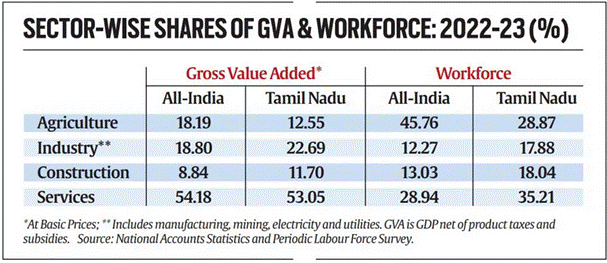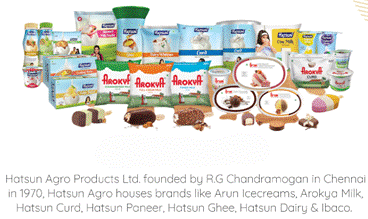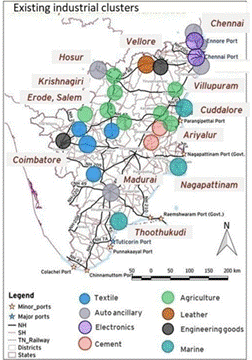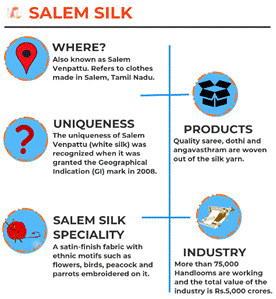PREVIOUS
Tamil Nadu Industrial Map Part - 02
August 14 , 2024
501 days
8581
0
Tamil Nadu Industrial Map Part - 02
(இதன் தமிழ் வடிவத்திற்கு இங்கே சொடுக்கவும்)
Tamil Nadu Industrial Guidance and Export Promotion Bureau
- The Tamil Nadu Industrial Guidance and Export Promotion Bureau, established in 1992, aims to attract major industrial projects to the state.
- Partnering with the World Economic Forum (WEF), Tamil Nadu established India’s first advanced manufacturing hub (AMHUB).
- This initiative aims to boost the state's position in the global manufacturing landscape.
- Additionally, Guidance, the nodal agency for Investment Promotion under the Department of Industries, Investment Promotion, and Commerce, received the prestigious United Nations Promotion Award 2023.
- The award was given for Excellence in Scaling Up Energy Transition Investments at the 8th World Investment Forum, held in Abu Dhabi, United Arab Emirates.

- It facilitates single-window clearance for industrial projects and implements the Assistance to States for Infrastructure Development of Exports and Allied Activities (ASIDE) Grant.

- Functions: The bureau scrutinizes proposals for the ASIDE Grant, ensuring their eligibility, and presents them to the State Level Export Promotion Committee (SLEPC).
- In line with Tamil Nadu Vision 2023, the bureau has identified 44 projects to receive grants from the Government of India.
- These grants aim to further enhance the state's industrial infrastructure.
Tamil Nadu’s Decentralized Industrialization Model
- Tamil Nadu has long been a frontrunner in India’s economic landscape, distinguished by its unique model of decentralized industrialization.
- Unlike many other states, where large conglomerates dominate the industrial scene, Tamil Nadu’s economic growth has been driven significantly by medium-scale businesses and "entrepreneurs from below."
Economic Complexity and Diversification
- Tamil Nadu’s economic complexity is unmatched in India, as evidenced by the diversity of its gross domestic product (GDP) and employment profile.

- The state’s agricultural sector contributes just 12.6% to its gross value added (GVA) and employs 28.9% of its workforce, both figures significantly below the national average.

- This lower dependence on agriculture is counterbalanced by higher contributions from industry, services, and construction, which collectively form a substantial part of Tamil Nadu’s economy.
- In comparison, Gujarat is more industrialized, with its factory sector generating 43.4% of the state’s GVA and employing 24.6% of its workforce.
- However, Gujarat’s economy is less diversified, with agriculture still accounting for 15.9% of its GVA and 41.8% of its workforce.
- This contrast highlights Tamil Nadu’s more balanced and diversified economic structure.
- One standout feature of Tamil Nadu’s agricultural sector is its high reliance on the livestock subsector.
- That contributes 45.3% of the state’s farm GVA—the highest for any state in India, far above the national average of 30.2%.

- This specialization has led to the emergence of major enterprises like Hatsun Agro Product, Suguna Foods, and the SKM Group.

Cluster-Based Industrialisation in Tamil Nadu
- Tamil Nadu's industrialisation has been uniquely characterised by the development of industrial clusters.

- These are agglomerations of firms that specialise in specific industries, often situated in small urban or peri-urban centres.
- This model has significantly spread economic activity across the state, reducing the proportion of the workforce dependent on agriculture.
- Some of the most prominent clusters include the following:
- Tirupur: Known as the "cotton knitwear hub," Tirupur recorded exports of ₹34,350 crore and domestic sales of ₹27,000 crore in 2022-23.
- Coimbatore: Renowned for its spinning mills and engineering goods, including castings, textile machinery, auto components, pump sets, and wet grinders.
- Sivakasi: Famous for its safety matches, firecrackers, and printing industry.
- Salem, Erode, Karur, and Somanur: Recognised for power looms and home textiles.
- Vaniyambadi, Ambur, and Ranipet: Centers of leather production.
- These clusters often support multiple industries within the same town, creating a dynamic industrial ecosystem.
- Karur: Known for power looms, bus body builders, and manufacturers of mosquito and fishing nets.
- Dindigul: Features spinning mills and leather tanneries.
- Namakkal: Notable for layer poultry farms, a large lorry fleet, bulk cargo logistics operators, and tapioca-based sago factories.
- Salem: A hub for power looms and tapioca starch-cum-sago producers.
- Erode: A textile and turmeric hub.
- In addition to these major clusters, more specialised clusters have emerged in smaller towns.
- Chatrapatti (Rajapalayam Taluk, Virudhunagar District): Dubbed the "bandage city" for its production of bandages, gauze pads, surgical cotton products, and woven dressings.
- Tiruchengode: Known as India’s "borewell rigs capital," where contractors take their truck-mounted rigs across the country.
- Natham (Dindigul District): Specialises in low-priced men’s formal shirts.
- These clusters have been instrumental in providing employment to people from surrounding villages, preventing large-scale migration to big cities for work.
- For instance, Tirupur’s knitwear industry alone employs around 800,000 people, including migrants from states like Uttar Pradesh, Bihar, Jharkhand, Odisha, and Assam.
- K.P.R. Mill Ltd. employs 21,819 permanent workers, with over 84% of them being women.
- These employees are primarily engaged at the company’s garmenting, knitting, spinning, and processing facilities in Tirupur, as well as in nearby Coimbatore and Erode districts.
Textiles in Tamil Nadu
- Gobichettipalayam, Pollachi, Theni, and Vedasandur (Dindigul District) are known for their cotton mills, with Rajapalayam being famous for its cotton market.
- Gobichettipalayam is also a prominent producer of white silk, with the country's first automated silk reeling unit present here.
- Kanchipuram and Arani are globally renowned for their pure zari silk sarees and handloom silk weaving industries.
- Other notable centers include Aruppukottai, Salem, and Sathyamangalam, famous for art-silk sarees, and handloom centers like Andipatti, Tiruchengodu, Paramakudi, and Kurinjipadi (Cuddalore district).
- Negamam (Pollachi), Cinnalapatti (Dindigul), Woraiyur (Trichy), and Pochampalli (Krishnagiri) are known for soft cotton saree weaving, while Madurai is famous for its Chungidi cotton sarees.
- The textile industry is indeed a cornerstone of Tamil Nadu's economy, contributing significantly to both the state's and the nation's GDP.
- Tamil Nadu accounts for one-third of India's textile businesses, holding 45% of the nation's spinning capacity and 10% of the handloom capacity.
- Avadi: Avadi is often referred to as the "Armoured Vehicles and Ammunition Depot of India" due to the presence of the Heavy Vehicles Factory (HVF) in the area.

- This factory is a part of the Armoured Vehicles Nigam Limited (AVANI) and plays a crucial role in manufacturing tanks and other armored fighting vehicles for the Indian Army.
- Coimbatore: Known as the "Cotton Town," Coimbatore is a major hub for textile mills, engineering industries, and motor pump manufacturing units.
- The city is a crucial player in India's cotton production and is also home to numerous spinning mills that supply yarn to various textile units across the state.
- Tirupur: Often referred to as the "Knit City," Tirupur is famous for its large-scale production of knitwear.

- The city is a global leader in the production and export of knitted garments, contributing significantly to India's export earnings in this sector.
- Salem: Salem is well-known for its handloom industry and is a key player in the production of art-silk sarees, along with other textiles.

- Erode: Erode is renowned for its turmeric production but is also a significant player in the textile industry, particularly in the production of woven garments and fabrics.
- Textile mills and engineering industries are present around the city of Coimbatore, which is home to textile, automotive spare parts, and motor pump manufacturing units.
- Cities like Tirupur and Erode are the country's largest exporters of knitwear, known for their textile manufacturing industries.
- The region around Coimbatore, Tirupur, Karur, and Erode is referred to as the "Textile Valley of India".
- The exports from Tirupur alone are reaching 50,000 million INR ($ 1,000 million), while Karur generates around 35,500 million INR ($ 750 million) annually in foreign exchange.
- 56% of India's total knitwear exports come from Tirupur, and Karur produces over 60% of India's home textiles.
Automobile Industry
- Tamil Nadu has a well-established automobile industry, attracting major investments from both global and Indian automobile companies.
- Global Companies: Major global automobile giants like BMW, Ford, Volkswagen, Renault-Nissan, Caterpillar, Hyundai, Mitsubishi Motors, and Michelin have established manufacturing plants in Tamil Nadu.
- These companies have chosen Tamil Nadu due to its strategic location, skilled workforce, and robust infrastructure.
- Indian Automobile Majors: Indian companies such as Mahindra & Mahindra, Ashok Leyland, Hindustan Motors, TVS Motors, and Royal Enfield also have significant operations in the state.
- The state is a major hub for manufacturing automobile spare parts and accessories, with companies like MRF, Apollo Tyres, and TAFE Tractors having a strong presence.
TAFE Tractors
- TAFE (Tractors and Farm Equipment Limited), established in 1960 in Chennai, is one of the largest tractor manufacturers globally and the second largest in India by volume.
- TAFE has an annual turnover exceeding INR 12,500 crores and holds a 25% share of the Indian tractor market.
- The company sells over 200,000 tractors annually, both within India and internationally.
- TAFE has maintained a partnership with AGCO Corporation and the Massey Ferguson brand for more than 60 years.
- Additionally, TAFE is a significant shareholder in AGCO Corporation, a $12.7 billion US-based manufacturer of tractors and agricultural equipment.
Specialised Manufacturing Hubs:
- Karur: Known for its bus body-building industries.
- Namakkal: Recognised for heavy vehicle and lorry body-building.
Leave a Reply
Your Comment is awaiting moderation.


